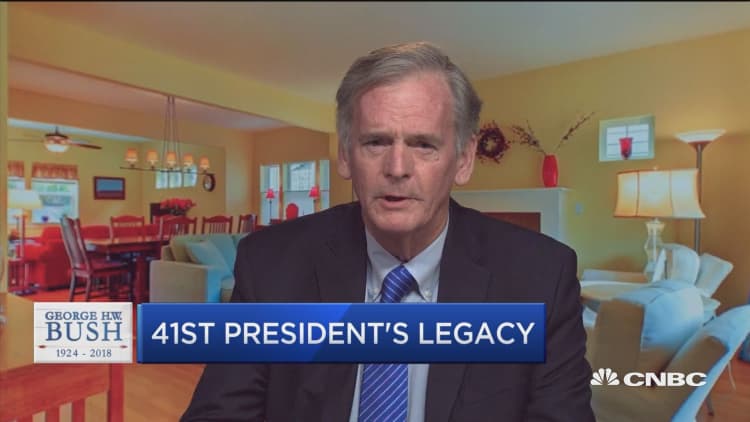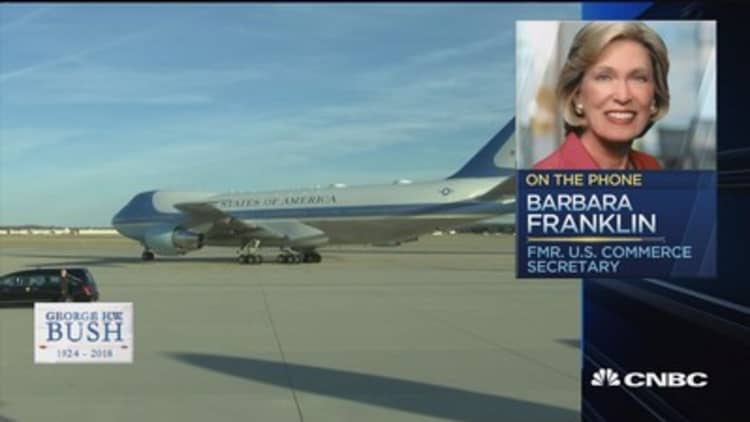On domestic policy, the rap sheet on George H.W. Bush read: "inbox president."
In the wake of the Reagan Revolution, that translated to passivity and the absence of his own agenda. The 41st president himself confessed struggling with "the vision thing."
Yet hindsight shows those assessments sold him short. Large problems landed in his inbox and Bush worked with a Democratic-controlled Congress to resolve them – even if he received scant credit at the time.
During his first year in the White House, Bush 41 and Congress enacted legislation to mop up the failing savings and loan industry. Ending that crisis, which festered through the Reagan years, ultimately cost financial institutions and taxpayers $481 billion. But it protected the savings of 25 million customers at insolvent S & Ls.
Bush's second year produced bigger achievements.

First, he reached agreement with lawmakers on the Americans with Disabilities Act to outlaw discrimination against the disabled in employment and public accommodations. Then, business lobbies such as the U.S. Chamber of Commerce and National Federation of Independent Business warned it would cause economic disaster; today they hail it as a landmark civil rights law.
Next, they reached agreement on amendments to the Clean Air Act that eventually tamed the pollution-driven threat of acid rain. It relied on the market-based approach of tradeable emissions credits – an innovative solution that Washington has since proven unable to emulate for the carbon emissions that cause global warming.
More significant, they persisted through torturous negotiations toward a compromise to restrain swelling budget deficits.
As they battled for the 1980 Republican presidential nomination, Bush accused Reagan of "voodoo economics" for insisting he could balance the budget while cutting taxes and boosting defense spending. Events proved Bush right, and Reagan handed his vice president a larger deficit than he inherited from Jimmy Carter.
The S&L cleanup made those deficits worse. The mid-1990 recession darkened the fiscal outlook further.
In his own 1988 campaign, Bush had pledged to resist any tax increases. That pleased his party's ascendant, anti-government conservatives, who favored shrinking taxes and spending in tandem.
Yet keeping that pledge would have precluded action on deficits. Congressional Democrats, determined to protect government services and benefits their party created during the New Deal and Great Society, opposed relying exclusively on spending cuts.

So Bush announced he wouldn't keep his promise. That enraged conservatives but produced a bipartisan deal. The president accepted several tax increases, most notably an increase in the top personal tax rate to 31 percent from Reagan's 28 percent. Democrats accepted spending cuts twice as large in dollar value.
Their deal, followed by another one three years later during Bill Clinton's presidency, paid long-term dividends. The 1990s ended with the economy booming and the federal budget in surplus.
But Bush reaped no political reward. Even after victory in the first Iraq War caused his popularity to soar, the recession then dragged it back down.
Bush suffered a conservative rebellion in 1992 GOP primaries, then lost in a three-way general election campaign against Clinton and independent business executive Ross Perot. While the economy had resumed growing by then, voters still felt beleaguered.
The fallout reshaped the Republican Party. No national GOP leader since has accepted that preserving the government services Americans want requires higher taxes.
Instead, the party has treated the levers of government power as a one-way ratchet down for tax rates. The next two Republican presidents – Bush's son and now Donald Trump – cut taxes though neither circumstances nor public sentiment have supported corresponding cuts in spending.
The visceral appeal of tax cuts to voters makes that politically attractive in the short-term. The 41st president chose a harder path.
"We have a deficit to bring down," Bush had said in his 1989 inaugural address. "We must ensure that America stands before the world united, strong, at peace and fiscally sound. But of course things will be difficult.
"We need to compromise," he continued. Bush spoke those words outside the Capitol where he now lies in state, having met that commitment.


